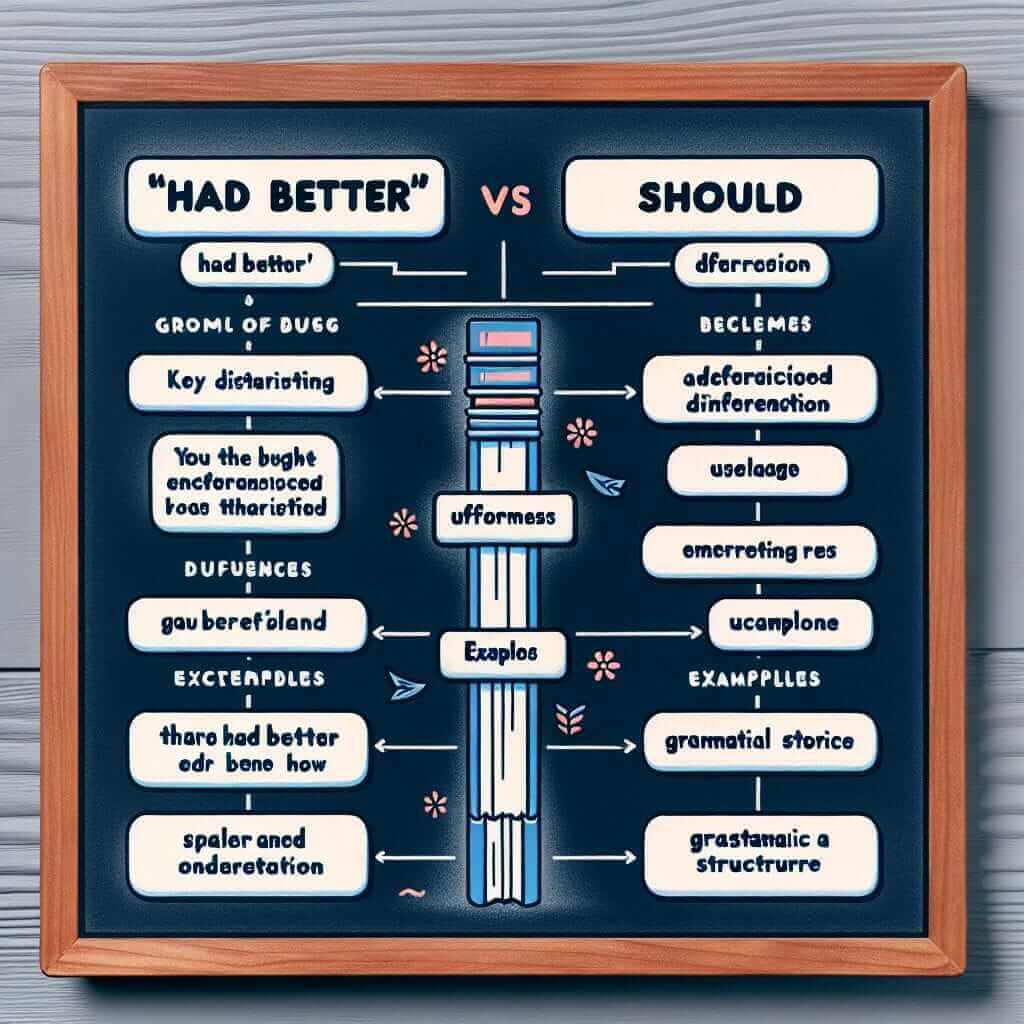“You had better study!” Many English learners have heard this phrase before, often from a well-meaning (but perhaps intimidating) teacher. While it might sound like a threat in some contexts, “had better” is a common way to give strong advice in English. This article will guide you through its nuances, ensuring you can confidently wield this structure to achieve your desired IELTS score.
Here are a few examples of how “had better” might appear in different sections of the IELTS:
- Speaking (Part 3): “Do you think people are less active today than in the past?” “Well, I think with the rise of technology, people had better be careful to get enough exercise.”
- Writing (Task 2): “In conclusion, governments had better invest in renewable energy sources if we want to combat climate change effectively.”
- Listening: You might hear a speaker say, “If you want to get tickets to the concert, you had better join the queue now – it’s getting long!”
As you can see, “had better” is versatile and can be used in various situations. Now, let’s explore its usage in detail.
Understanding “Had Better”
“Had better” is used to express strong advice or a warning about a potential negative consequence. It implies that it is strongly recommended to follow the advice given. It’s crucial to remember that “had better” is different from simply saying “should.”
- “Should” offers a suggestion or recommendation.
- “Had better” implies a warning or a sense of urgency.

The Structure and Usage of “Had Better”
Here’s the grammatical structure of “had better”:
Had better + base form of the verb
Examples:
- You had better study for your exam tomorrow.
- They had better leave now if they want to catch the train.
- We had better not be late for the meeting.
Important Considerations:
- Formality: “Had better” is generally considered quite direct and even a bit informal. While it’s acceptable in spoken English and informal writing, it’s generally best to avoid it in formal writing tasks for the IELTS.
- Negative Form: To form the negative, simply add “not” after “had better,” as in the example above (“We had better not be late”).
- Past Form: Despite using “had,” “had better” refers to the present or future, not the past.
Using “Had Better” Effectively in the IELTS
While “had better” might not be suitable for every situation in the IELTS, it can be effectively used in both the Speaking and Writing sections:
Speaking:
- Expressing strong opinions: “To reduce traffic congestion, I believe the government had better invest in public transportation.”
- Giving advice: “If you’re struggling with the Listening section, you had better practice with authentic recordings.”
Writing (Task 2 – informal letters):
- Giving advice to a friend: “You mentioned feeling stressed about your upcoming exams. You had better make a study plan and try to stick to it.”
Here’s an example of how you might use “had better” in an IELTS Writing Task 2 essay:
Question: Some people believe that the best way to reduce crime is to impose stricter punishments on criminals. To what extent do you agree or disagree?
Sample paragraph using “had better”:
While stricter punishments might deter some individuals, it is not a comprehensive solution. Governments had better address the root causes of crime, such as poverty and lack of education, to create a safer society.
Common Mistakes and How to Avoid Them
-
Incorrect tense: Remember that “had better” always uses “had,” even when referring to the present or future.
- Incorrect: He have better study for his test.
- Correct: He had better study for his test.
-
Using “had better” for weak suggestions: “Had better” should be reserved for strong advice or warnings, not simple suggestions.
- Inappropriate: You had better try this new restaurant.
- More appropriate: You should/could try this new restaurant (if it’s just a suggestion).
Conclusion
Mastering “had better” can add a layer of nuance and naturalness to your English, potentially boosting your IELTS score. However, it’s crucial to use it appropriately and strategically. By understanding its meaning, structure, and common pitfalls, you can confidently incorporate this powerful phrase into your IELTS preparation. Remember to practice using “had better” in various contexts to solidify your understanding and ensure you’re ready to tackle any scenario in the exam.